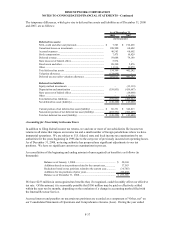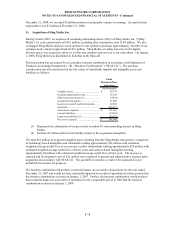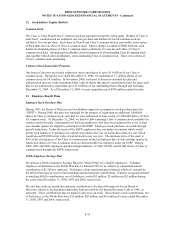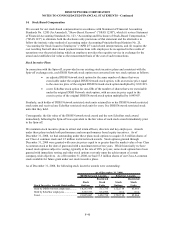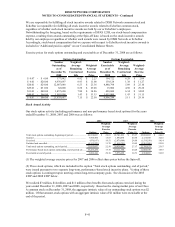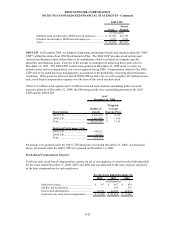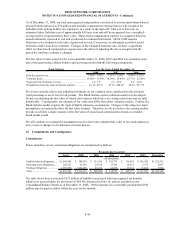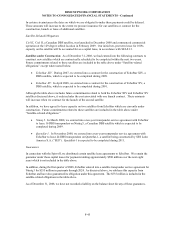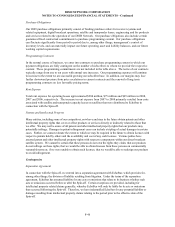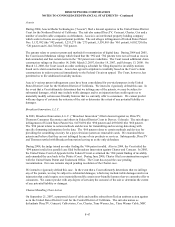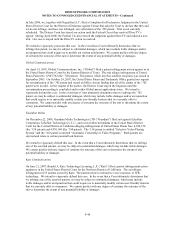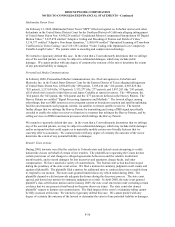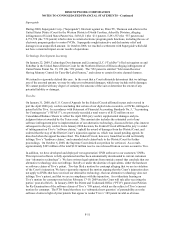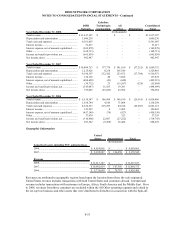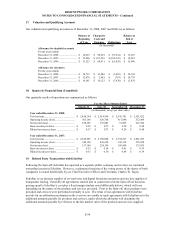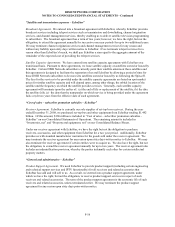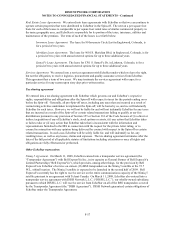Dish Network 2008 Annual Report Download - page 129
Download and view the complete annual report
Please find page 129 of the 2008 Dish Network annual report below. You can navigate through the pages in the report by either clicking on the pages listed below, or by using the keyword search tool below to find specific information within the annual report.DISH NETWORK CORPORATION
NOTES TO CONSOLIDATED FINANCIAL STATEMENTS - Continued
F-47
Acacia
During 2004, Acacia Media Technologies (“Acacia”) filed a lawsuit against us in the United States District
Court for the Northern District of California. The suit also named DirecTV, Comcast, Charter, Cox and a
number of smaller cable companies as defendants. Acacia is an intellectual property holding company
which seeks to license an acquired patent portfolio. The suit alleges infringement of United States Patent
Nos. 5,132,992 (the ‘992 patent), 5,253,275 (the ‘275 patent), 5,550,863 (the ‘863 patent), 6,002,720 (the
‘720 patent) and 6,144,702 (the ‘702 patent).
The patents relate to certain systems and methods for transmission of digital data. During 2004 and 2005,
the Court issued Markman rulings which found that the ‘992 and ‘702 patents were not as broad as Acacia
had contended, and that certain terms in the ‘702 patent were indefinite. The Court issued additional claim
construction rulings on December 14, 2006, March 2, 2007, October 19, 2007, and February 13, 2008. On
March 12, 2008, the Court issued an order outlining a schedule for filing dispositive invalidity motions
based on its claim constructions. Acacia has agreed to stipulate to invalidity based on the Court’s claim
constructions in order to proceed immediately to the Federal Circuit on appeal. The Court, however, has
permitted us to file additional invalidity motions.
Acacia’s various patent infringement cases have been consolidated for pre-trial purposes in the United
States District Court for the Northern District of California. We intend to vigorously defend this case. In
the event that a Court ultimately determines that we infringe any of the patents, we may be subject to
substantial damages, which may include treble damages and/or an injunction that could require us to
materially modify certain user-friendly features that we currently offer to consumers. We cannot predict
with any degree of certainty the outcome of the suit or determine the extent of any potential liability or
damages.
Broadcast Innovation, L.L.C.
In 2001, Broadcast Innovation, L.L.C. (“Broadcast Innovation”) filed a lawsuit against us, DirecTV,
Thomson Consumer Electronics and others in Federal District Court in Denver, Colorado. The suit alleges
infringement of United States Patent Nos. 6,076,094 (the ‘094 patent) and 4,992,066 (the ‘066 patent).
The ‘094 patent relates to certain methods and devices for transmitting and receiving data along with
specific formatting information for the data. The ‘066 patent relates to certain methods and devices for
providing the scrambling circuitry for a pay television system on removable cards. We examined these
patents and believe that they are not infringed by any of our products or services. Subsequently, DirecTV
and Thomson settled with Broadcast Innovation leaving us as the only defendant.
During 2004, the judge issued an order finding the ‘066 patent invalid. Also in 2004, the Court ruled the
‘094 patent invalid in a parallel case filed by Broadcast Innovation against Charter and Comcast. In 2005,
the United States Court of Appeals for the Federal Circuit overturned the ‘094 patent finding of invalidity
and remanded the case back to the District Court. During June 2006, Charter filed a reexamination request
with the United States Patent and Trademark Office. The Court has stayed the case pending
reexamination. Our case remains stayed pending resolution of the Charter case.
We intend to vigorously defend this case. In the event that a Court ultimately determines that we infringe
any of the patents, we may be subject to substantial damages, which may include treble damages and/or an
injunction that could require us to materially modify certain user-friendly features that we currently offer to
consumers. We cannot predict with any degree of certainty the outcome of the suit or determine the extent
of any potential liability or damages.
Channel Bundling Class Action
On September 21, 2007, a purported class of cable and satellite subscribers filed an antitrust action against
us in the United States District Court for the Central District of California. The suit also names as
defendants DirecTV, Comcast, Cablevision, Cox, Charter, Time Warner, Inc., Time Warner Cable, NBC


